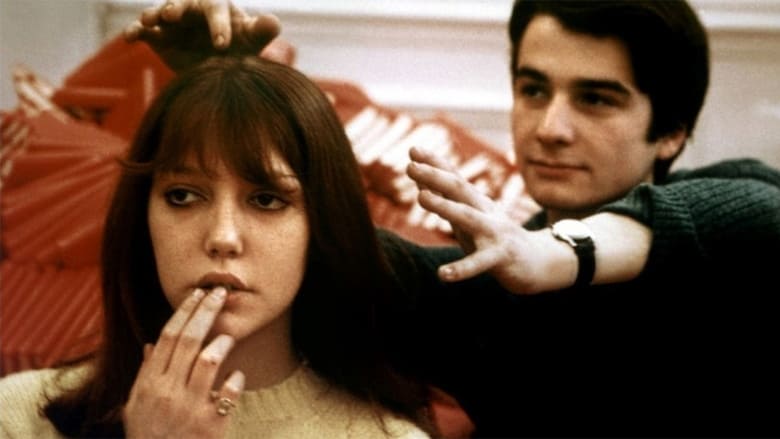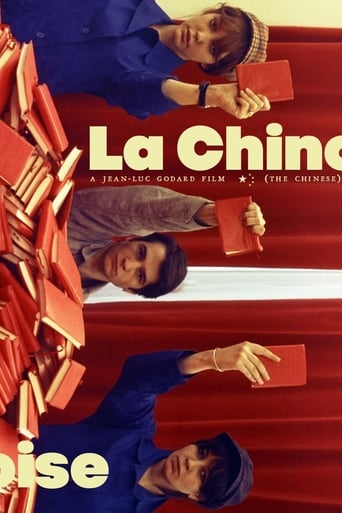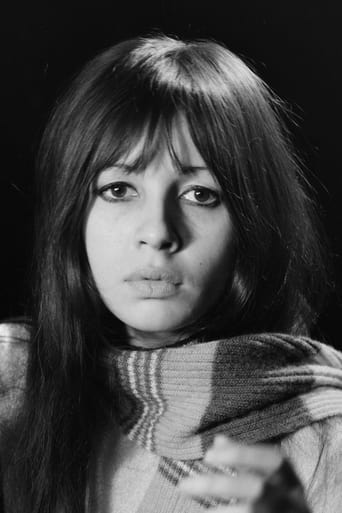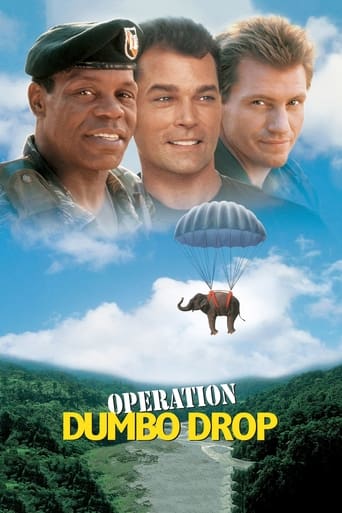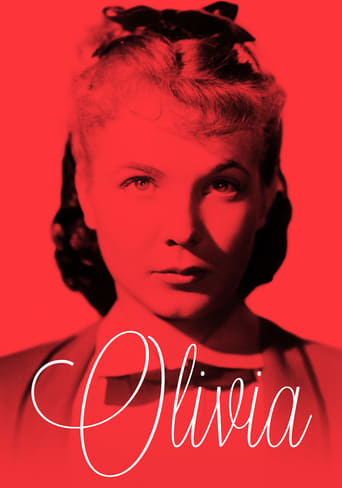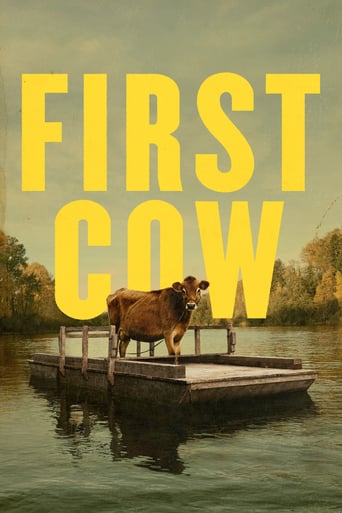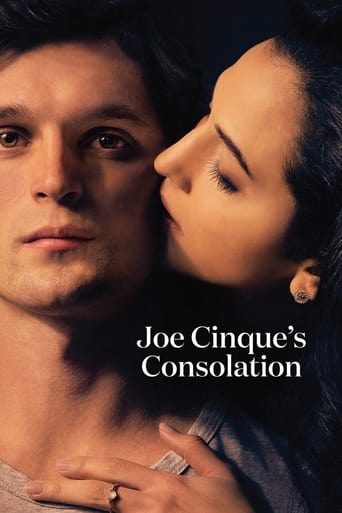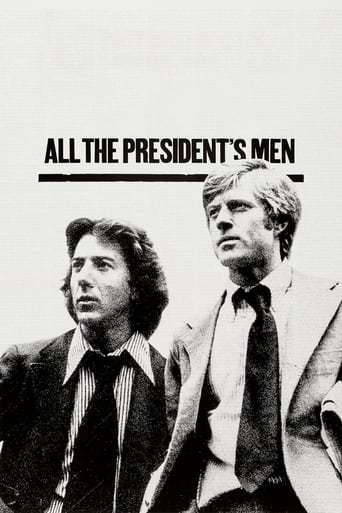La Chinoise (1968)
A small group of French students are studying Mao, trying to find out their position in the world and how to change the world to a Maoistic community using terrorism.
Watch Trailer
Free Trial Channels
Cast


Similar titles
Reviews
i know i wasted 90 mins of my life.
Simple and well acted, it has tension enough to knot the stomach.
The movie is made so realistic it has a lot of that WoW feeling at the right moments and never tooo over the top. the suspense is done so well and the emotion is felt. Very well put together with the music and all.
Great example of an old-fashioned, pure-at-heart escapist event movie that doesn't pretend to be anything that it's not and has boat loads of fun being its own ludicrous self.
Roman Polanksi once said that "people like Godard are like little kids playing at being revolutionaries", noting that he had actually grown up surrounded by the realities of communism. As a general rule I would always try to avoid a filmmaker's personal tastes, opinions and politics but, as La Chinoise is essentially a political statement, it's impossible not to let the Godard's politics affect my opinion of it. Sadly, Polanski's comment sums this film up perfectly.There is no plot. What we are subjected to amounts to little more than a series of vignettes of utterly bourgeois adolescents rambling their tin- pot political philosophies from the comfort of their upper middle class apartments. Was this supposed to be ironic? Or are we supposed to buy into the ideas of these vacuous kids? It fails on both levels. All I wanted to do was give all of them a good slap across the chops and tell them to grow up.Am I missing the point? Do I just not get it? Perhaps, and I'm fine with that. I truly love some of Godard's films; Vivra Sa Vie, Pierrot Le Fou, Le Mepris. The difference is that all of these films had something or someone for me to care about. The one thing that might have saved La Chinoise for me would have been for all the characters to catch bubonic plague and die horribly. That's would have cheered me up.Stylistically the film has Godard written all over it but, by the time this film came out (in 1967), these flairs were already wearing a little thin, especially when they're essentially there to veil an utterly feckless piece of propaganda. The only point of vague interest here is the slightly eerie way in which this film precipitated the riots of May 1968. This alone, however, is not worth the 85 minutes of your life you will wish you could have back if you decide to sit through this twaddle.
In 1967, Jean-Luc Godard was sort of on a precipice of his career- right from the genre-bending experimental films that put him as a bizarre art-house hallmark, right before stepping off into going even further, and becoming a full-blown Maoist. How much of what he felt or thought influenced La Chinoise I can't say (never read a biography), but what I can sense from this film is the sense of an inner-contradiction working itself out in the form of a film that is playful and harsh, visually vibrant and emotionally subtle, if not present at all, and a documentary at the same time as a piece of deranged pop theater. In fact, it's a pseudo-documentary, and it's one of the most lucid films that Godard ever conceived, but more than anything La Chinoise acts as a counterpoint to hardcore, fundamental terrorist ideology. I can't be sure what side Godard would take, the young girl played by Wiazemsky who thinks the only way she can go past the reading and the discussion is to go to and start something as a working-class bomb chucker, or the young chemist who decides to drop out of the 'game' of sorts when he keeps seeing that she (Wiazemsky's Veronique, the same placid features which made her tragic in Au hasard Balthazard here make her almost psychotic) doesn't have a real grasp on what she or the other radicals are talking about.Godard's film is packed with attitude though, so one can't see this as being something of a communist cautionary tale- you can tell that he does find a good deal in the little red book of Mao captivating. We hear a hard-pounding Mao rock song that dances between new anthem and parody. We see Jean-Pierre Leaud going on and on about this or that as the "actor" of the group and aiming arrows at liberal figureheads. When he first says it there's a brilliant sense of momentary self-consciousness as we see the cameraman and the sound-guy shooting, and this later reverts back into what is like a documentary on the fiction of the documentary of the movie if that makes sense. Then classical music rises up, and then cuts off in a flash. Like the characters, there is a sensibility of hope in some change, at least in this case with cinema, in approaching image and montage, composition, primary colors popping out at times like seas of red.But at the same time he's almost going back and doing his own self-criticism. If one's seen at least one or two or more Godard films, primarily from the 60s, one often sees a character reading from a book on camera, sometimes for a long time. This time we see the characters stripped-down: they have nothing from experience, only from a kind of drunk-the-kool-aid reverence to the red book, with the kids or "guest" lecturers in the classroom scenes going on about it. I liked that, Godard fessing up to the futility of fervent worship, or rather stalwart dedication, to using up all ideas from a text. Aside from Anne Wiazemsky's character- and even she, by the end, just goes back to the way things were- the characters aren't really into practicing what they preach, despite the preaching 'heavy' and the discussion as highly charged as one would expect for 67-going-on-68 (if perhaps, like Easy Rider, anticipating the demise of the power behind a specific counter-cultural group). Political nerve and rebellion gets criss-crossed with what is and what isn't the truth with these kids; they love Lenin and Marx as much as they love theater and movies acting. It's this loop of goofing around (I love the bit when two of the girls are playing with some contraption as if it were bull's horns, and one guy comes into the apartment and says 'ah, steering wheel'), and pontification that becomes fascinating. The scene on the train, with one shot where suddenly the color goes murky and the tone of the conversation between Veronique and the older man turns towards the realities of violence as a means of political ends, is extraordinary. If it's at all a great film it's not simply because of Godard's experimentation, which is of course at its peak (he also made Week End the year this came out, his most ambitious and f****d-up film, maybe the craziest mix of statements in one movie ever). On the surface, at least at the start, it looks like another Godard Maoist mumble. Yet like in his earlier work, he puts the ideas back onto the characters, and doesn't make a muck of narration points or too many tangents. Like a documentary, we see the inner-workings and bias of a particular viewpoint. Like theater, it's colorful, hyper-active, entertaining to a weird fault. And like political science it dissects its subjects with some degree of respect for what is being talked about- communism- while never forgetting the damages it causes.
There are many great things about 'La Chinoise', including its political and historical importance, which have been elaborately discussed by film enthusiasts all over the world, so I'd like to add only my very personal thoughts about this film. Personally, 'La Chinoise' stands very much apart from, if not above, all of the films I've seen. While other films of Godard make me feel they are great movies, 'La Chinoise' doesn't make me feel like that. It makes me feel as if I hadn't seen a film, as if I'd just had a very nice and exciting conversation with friends, as if I'd just had a very lively discussion with them, as if I'd just participated in a hot debate, as if I'd just quarreled with some people. No film ever made me feel like this.Scenes and dialogues worthy of remembering in 'La Chinoise' are as innumerable as in other films of Godard. Forever imprinted on my memory are the scenes when Leaud can't understand what his girlfriend says without the help of music, the droll assassination scene, and most important of all, the discussion on the train. This train scene looks so simple, yet it is very subtle and powerful. I saw 'La Chinoise' the first time four years ago, and I felt very detached from the movie. Seeing it again, I think it is one of my most favorite now.
Shot a few months before his next masterpiece, La Chinoise is perhaps Godard's best film. The bourgeois Leninist-Communist struggle our commune is doing is both extremely tragic as is a comic one. The film is titled also 'a film in a making' and the film is indeed in a making with all the usual godard tricks such as actors talking to the camera, interviews showing the camera and the production men and so on. But these tricks come not without reason as we witness the group's struggle with what godard was struggling at the time: the fight in two ways. The artistic and the politic one. Godard as well known decided in 1968, a year after this film that 'a political intellectual has only one way to become one: stop being an intellectual' (this is not the precise quoting). This film struggles with some of the most modern and post-modern issues such as the function of language, and the implausibility of the fight against capitalism, and the modern necessity of being a bourgeois and a consumer. the only struggle that is possible is perhaps through art (theater) which is what our heroes do, and what godard is doing. and perhaps he had that notion all through his communistic period. Godard is for me the best Director ever. Each film is like a manifest. each line is poetry. each word is a world.ido,

